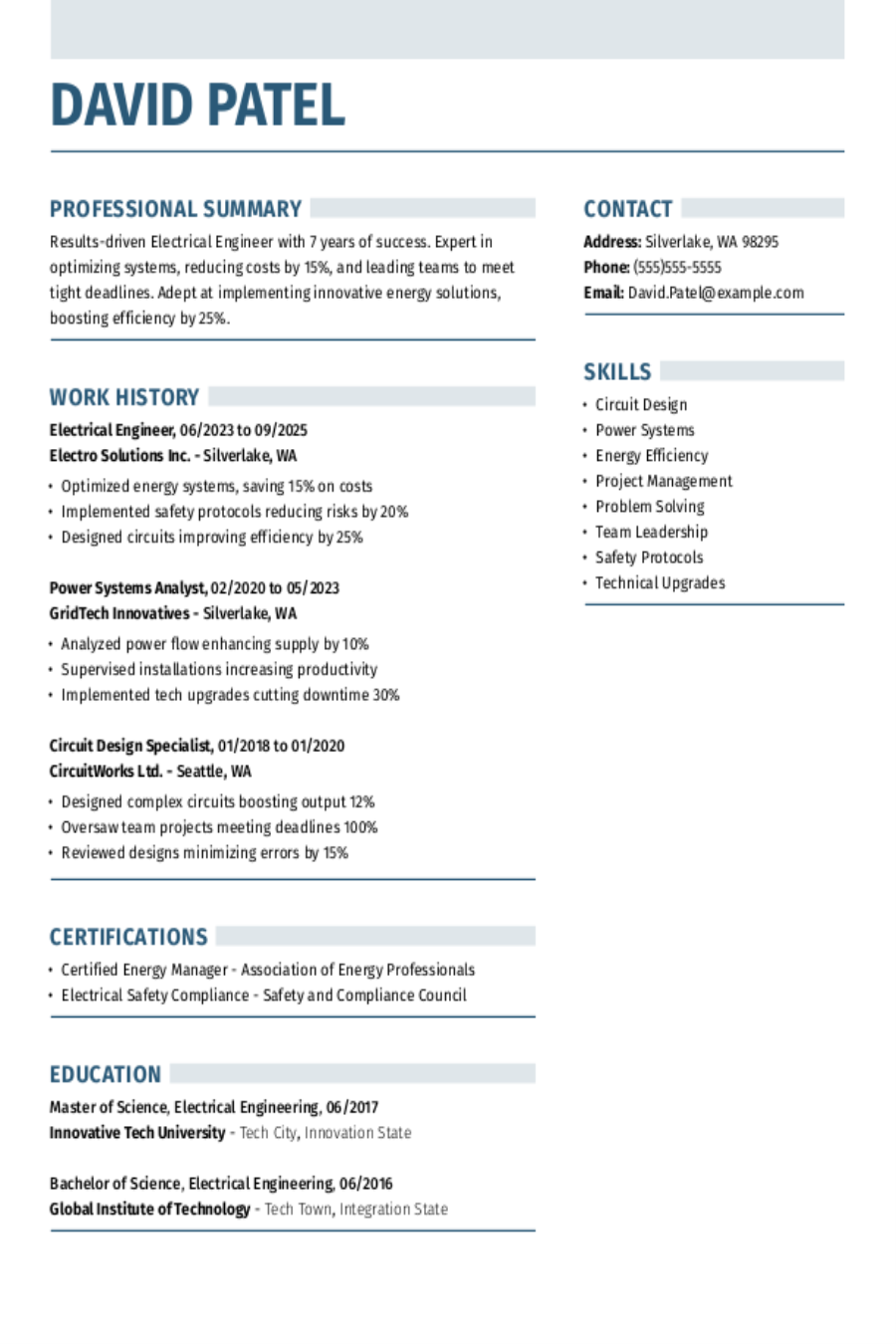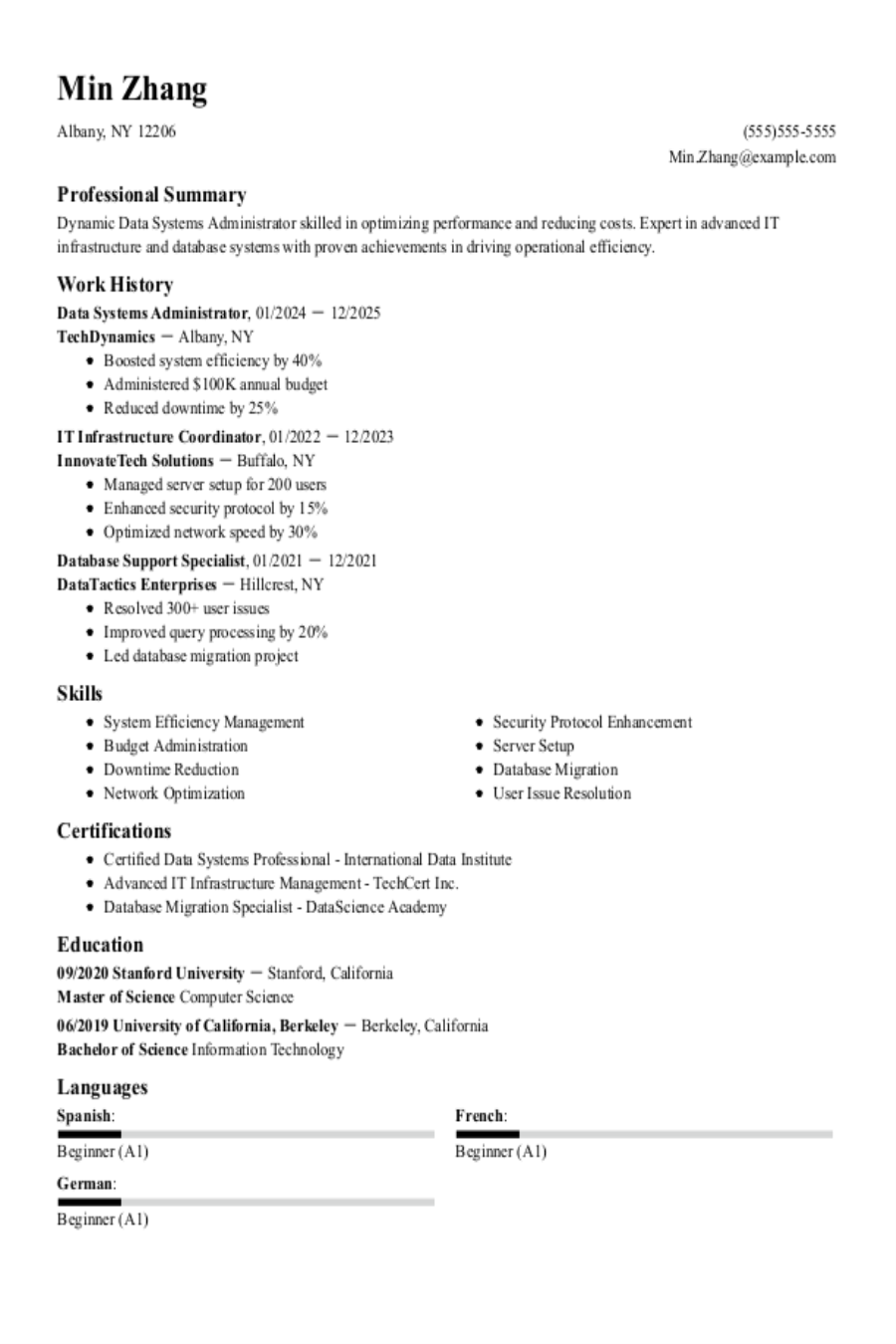Popular Hospital Pharmacist Resume Examples
Entry-level hospital pharmacist resume
An entry-level resume for a hospital pharmacist should highlight relevant educational background, pharmacy internships, certifications, and essential skills in patient care, medication management, and teamwork to show capability.
Emphasizes soft skills: This resume highlights the job seeker's strong soft skills such as patient counseling and collaboration, which effectively compensate for limited experience.
Showcases education: This resume begins with academic details, leveraging the candidate’s degrees to support their overall presentation.
Mid-career hospital pharmacist resume
A mid-career hospital pharmacist resume should emphasize a combination of clinical expertise, effective communication skills, and evidence of ongoing professional development to demonstrate value in patient care and pharmacy management.
Includes mix of skills: This resume effectively combines technical skills in medication management and clinical research with interpersonal abilities in patient counseling and team leadership, highlighting the applicant's well-rounded expertise.
Begins with a powerful summary: This resume's professional summary highlights essential qualifications of a hospital pharmacist, showcasing experience in medication management and patient education.
Experienced hospital pharmacist resume
An experienced hospital pharmacist resume should prioritize highlighting relevant clinical experience, key achievements in patient care, and continuous professional development to effectively showcase their expertise and career growth.
Quantifies achievements: Quantifiable achievements provide clear evidence of your impact as a hospital pharmacist. By showcasing specific metrics, such as a 25% increase in patient care services, you make your contributions easily recognizable to recruiters.
Highlights experience: The resume's opening summary effectively showcases over a decade of experience in pharmacy roles, immediately establishing the candidate's credibility.
No experience hospital pharmacist resume
A resume for an applicant with no experience as a hospital pharmacist should highlight relevant coursework, certifications, and any volunteer work or internships to showcase the applicant's knowledge and commitment to the healthcare field.
Overcomes lacking experience: Incorporating extracurricular activities and volunteer work improves this resume by highlighting transferable skills and community involvement, which complement limited professional experience in pharmacy.
Avoids jargon: Job seekers often feel pressured to embellish their experience with complex terminology, thinking it will make them appear more qualified. However, this straightforward resume prioritizes clarity and communicates effectively.
More resume examples
Hospital Pharmacist Resume Template
Looking for a way to showcase your expertise? Use this hospital pharmacist resume template as a foundation—simply personalize it with your unique experience and qualifications.
Jane Wilson
Springfield, IL 62701
(555)555-5555
Jane.Wilson@example.com
Professional Summary
Efficient hospital pharmacist with 6 years of experience in medication management and clinical drug optimization. Proven track record in improving patient safety and reducing costs. Expert in inventory control and staff development.
Work History
Hospital Pharmacist
Greenfield Hospital - Springfield, IL
June 2023 - October 2025
- Managed medication inventory, reducing errors by 15%
- Collaborated with medical staff to optimize drug therapies
- Implemented new system, improving efficiency by 20%
Clinical Pharmacist
Harmony Health Clinic - Chicago, IL
January 2021 - May 2023
- Conducted medication reviews, increasing patient compliance
- Reduced medication costs by negotiating drug contracts
- Provided drug information to healthcare professionals
Pharmacy Manager
Riverside Medical Center - Springfield, IL
January 2019 - December 2020
- Led team of 5 pharmacists, improving services by 30%
- Optimized inventory procedures, reducing waste
- Designed training programs, enhancing staff skills
Skills
- Medication Management
- Patient Safety
- Drug Therapy Optimization
- Cost Reduction Strategies
- Inventory Control
- Clinical Research
- Regulatory Compliance
- Staff Training
Education
Master of Science Clinical Pharmacy
University of Arizona Tucson, Arizona
May 2019
Bachelor of Science Pharmaceutical Science
Arizona State University Tempe, Arizona
May 2017
Certifications
- Certified Clinical Pharmacist - American Pharmacists Association
- Pharmacy Technician Certification - National Healthcareer Association
Languages
- Spanish - Beginner (A1)
- French - Beginner (A1)
- German - Intermediate (B1)
Must-Have Skills on a Hospital Pharmacist Resume
A strong skills section is one of the most critical components of a compelling resume.
Healthcare and medical professionals make a direct impact on individual and community well-being. The skills you highlight should reflect your ability to deliver dependable support and uphold high standards. Your resume is a chance to show how you contribute meaningfully to quality care and positive outcomes.
The following data outlines the most prevalent hard and soft skills for a hospital pharmacist resume based on Resume Now’s internal resume analysis.
When you’re ready to improve your resume with skills, check out our AI Resume Skills Generator. It provides tailored suggestions for both hard and soft skills relevant to your job title, helping you create a robust and personalized skill set.
Writing Your Hospital Pharmacist Resume
Having explored these effective resume examples, you are now prepared to dive into the process of crafting your own. We'll walk you through each section step by step, ensuring you understand how to write a resume that stands out.
List your most relevant skills
An effective skills section for your hospital pharmacist resume should highlight both your technical abilities, like medication management and patient counseling, and soft skills such as attention to detail and communication. This mix paints a comprehensive picture of your qualifications.
Ensure you incorporate keywords from the job listing into your skills section. Not only does this align you with specific employer needs, but it also helps applicant tracking systems recognize you as a suitable applicant. By doing so, you'll increase your chances of moving past initial screenings and catching the eye of hiring managers.
Example of skills on a hospital pharmacist resume
- Proficient in managing medication therapy and optimizing patient outcomes
- Knowledgeable in pharmacokinetics and drug interactions
- Strong communicator with a focus on patient education
- Adaptable team player dedicated to collaborative healthcare solutions
Your skills section should clearly convey your readiness for the hospital pharmacist position. Include both the technical skills specified in the job description and essential soft skills, illustrating your comprehensive preparation to fulfill the role's responsibilities effectively. This balanced approach will demonstrate to employers that you are fully equipped to contribute to their team.
Highlight your work history
Your work experience section allows you to shine by showcasing your key achievements and demonstrating how you've applied your expertise in various settings. Focus on quantifiable results and specific contributions that illustrate your impact on patient care and medication management.
For each job entry, include essential information such as your job title, the name of the healthcare facility, and the dates of employment. Doing so establishes your professional timeline and credibility as a pharmacist. Remember to highlight significant accomplishments, like improving medication safety protocols or improving patient education programs.
Example of a hospital pharmacist work experience entry
- Hospital Pharmacist
City Hospital - San Francisco, CA
June 2021 - Present - Review and verify medication orders for accuracy and appropriateness, ensuring patient safety and compliance with pharmacy regulations
- Collaborate with healthcare teams to develop individualized patient care plans, improving therapeutic outcomes and promoting optimal drug utilization
- Provide drug information and education to medical staff and patients, improving understanding of treatment options and adherence rates by 30%
- Supervise pharmacy technicians in daily operations, fostering a team-oriented environment that improved workflow efficiency by 25%
- Conduct medication reconciliation processes upon patient admission and discharge, reducing medication errors by 40%
Highlighting outcomes and achievements in your experience section is essential for capturing the attention of employers. By showcasing specific contributions you've made, such as improving patient care or optimizing medication processes, you demonstrate your effectiveness and value as a hospital pharmacist. This results-oriented approach not only differentiates you from other applicants but also illustrates your commitment to excellence in pharmacy practice.
Include your education
The education section of your hospital pharmacist resume should be organized in reverse-chronological order, starting with your most recent educational achievement. Include your pharmacy degree and any relevant certifications while omitting your high school diploma if you have completed a higher level of education.
If you are currently enrolled in a pharmacy program or pursuing additional qualifications, list your highest completed degree along with an expected graduation date. Including bullet points showcasing relevant coursework or academic accomplishments is helpful, especially if you are a recent graduate.
Common certifications for a hospital pharmacist resume
- Board Certified Pharmacotherapy Specialist (BCPS) – American Pharmacists Association (APhA)
- Certified Geriatric Pharmacist (CGP) – American Society of Consultant Pharmacists (ASCP)
- Certified Diabetes Educator (CDE) – National Certification Board for Diabetes Educators (NCBDE)
- Medication Therapy Management Certification (MTM-Cert) – National Council for Prescription Drug Programs (NCPDP)
Sum up your resume with an introduction
A strong profile section is important to your resume as it creates an immediate impression of who you are and what you bring to the table.
For those with experience in pharmacy, a professional summary is particularly effective. It allows you to highlight key achievements, certifications, and relevant skills that demonstrate your expertise. If you’re entering the workforce, try adding a resume objective that highlights your commitment to progressing in your career.
Professional summary example
Dedicated hospital pharmacist with over 5 years of experience in patient-centered care within a dynamic healthcare setting. Demonstrated success in optimizing medication management and improving patient outcomes through effective collaboration with multidisciplinary teams. Expert in pharmaceutical care, drug utilization review, and clinical consultation.
Resume objective example
Enthusiastic hospital pharmacist eager to use strong communication and problem-solving skills in a collaborative healthcare environment. Looking to apply attention to detail and a commitment to patient care to improve medication management processes and support positive health outcomes.
As a hospital pharmacist, your resume profile is important for making a strong first impression. By incorporating relevant keywords from the job description, you can effectively highlight your qualifications and experience. This strategic approach not only showcases your suitability for the role but also improves your chances of passing through ATS systems used by employers.
Add unique sections to set you apart
Optional resume sections are a great way for you to highlight your unique qualifications as a hospital pharmacist. These sections allow you to showcase additional skills, experiences, and attributes that set you apart from other applicants.
Including relevant hobbies or volunteer work not only enriches your resume but also gives potential employers insight into your values and work ethic. For instance, if you participate in health awareness campaigns or engage in community service, it reflects your commitment to patient care and public health. Such details can effectively demonstrate how your personal interests align with the responsibilities of a hospital pharmacist.
Three sections perfect for a hospital pharmacist resume
- Languages: As a hospital pharmacist, effective communication with patients and healthcare teams is important. Highlighting your language skills on your resume can improve patient understanding and improve medication management outcomes.
- Volunteer Work: Including volunteer work on a resume not only showcases your dedication to community service but also highlights valuable skills that can improve your role as a hospital pharmacist.
- Accomplishments: As a hospital pharmacist, measurable results are vital for demonstrating your effectiveness in medication management. Include these achievements in your job descriptions or create an accomplishments section to spotlight them.
5 Resume Formatting Tips
- Choose a format that matches your career stage.
Choosing the right resume format is important for showcasing your skills effectively. If you’re an experienced hospital pharmacist, a chronological format highlights your career progression well. However, if you're just starting out, consider a functional format to emphasize your skills and training instead. A combination format can also work well if you have relevant experience and qualifications.
- Pick a smart resume template.
Using a resume template is essential for ensuring your information stands out. It improves readability and makes formatting straightforward. If you opt for a custom format, maintain simplicity and select fonts that are friendly for applicant tracking systems to ensure your resume gets noticed.
- Select an appropriate font.
Choose a clear, professional font to improve resume readability. Fonts like Helvetica, Georgia, or Verdana are excellent choices that ensure your skills and experience stand out to both ATS and hiring managers.
- Use consistent formatting.
Ensure your resume is neatly aligned with uniform margins. This creates a polished and professional look that captures attention and conveys attention to detail.
- Keep your resume to one or two pages.
When making your resume, remember that resumes should be one page long in most cases. Focus on including only the most relevant information to ensure clarity and impact. If you have extensive experience, a two-page format may be acceptable, but keep it concise.
Tools for Your Job Search
Are you ready to advance your career as a hospital pharmacist? Before sending in your application, take advantage of our ATS Resume Checker. This essential tool provides insights into how effectively your resume meets the requirements of automated applicant tracking systems commonly used by healthcare facilities.
Need help crafting the perfect resume? Our AI Resume Builder offers personalized recommendations tailored to your pharmacy expertise, along with professionally designed templates that ensure your qualifications and experiences are presented clearly and compellingly.
Frequently Asked Questions
Last Updated: November 3, 2025
Absolutely. A cover letter is important as it provides context to your resume and allows you to communicate directly with employers. It’s your opportunity to express your enthusiasm for the hospital pharmacist role and explain how your unique skills and experiences make you an ideal applicant. Take this chance to write a cover letter that stands out.
For a quick solution, try our AI Cover Letter Generator, which can help you create a tailored cover letter in just minutes. You’ll find various cover letter template options available that align perfectly with your resume, making it easier for you to present your qualifications effectively.
A resume is generally concise, typically spanning one to two pages, and focuses on summarizing your work experience and skills. In contrast, a CV (curriculum vitae) can extend several pages, providing detailed information about your academic achievements, research contributions, publications, and professional experiences.
You should use a CV when applying for positions in academia or specialized fields like pharmacy. If you need to create an impressive CV quickly, our online CV Maker service makes it easy! Choose from a variety of tailored CV templates designed for different industries and career levels to craft the perfect document effortlessly.
If you have gaps on your resume, be honest about the reasons behind them. Discuss what you did during that time—whether it was volunteering, taking courses, or caring for family—to demonstrate to potential employers that you were proactive and committed to personal growth. Once you've addressed the gap, shift the conversation back to your relevant skills and experiences that make you a great fit for the hospital pharmacist position.
To improve your chances when applying for positions, choose a resume template that's ATS-friendly and tailor your content to closely match the job descriptions. This strategy helps ensure key terms are recognized and boosts your visibility to employers. A common mistake hospital pharmacists make is using templates that are not ATS-compatible.
Hospital pharmacists often begin their careers as pharmacy technicians, gaining essential experience. With advanced education and licensure, they can progress to senior pharmacist roles or specialize in areas like clinical pharmacy or pharmacotherapy.
As a hospital pharmacist, you can showcase your dedication to professional growth by obtaining relevant certifications and sharing them on your resume. Include any courses you've taken, seminars you've participated in, and books or podcasts that keep you informed about the latest trends. Additionally, being an active member of professional associations highlights your commitment to staying current in the field.
Was this information helpful? Let us know!
Hailey is a career advice writer dedicated to helping job seekers excel in their careers.
More resources

AI-Resistant Careers Index 2026: 20 Jobs That AI Can’t Replace
Resume Now s latest report breaks down the most AI-proof caree...

60% of U.S. Workers Expect AI to Eliminate More Jobs Than It Creates in 2026
Resume Now s newest report shows growing concerns about the im...

Best Resume Font for 2026 (+ Size and Formatting Tips)
Find the best resume font for your resume with our comprehensi...

Electrical Engineering Resume: Examples & Templates
As an electrical engineer you need a resume that showcases yo...

Electrical Resume: Examples & Templates
As an electrical professional you need a resume that captures...

Data Systems Administration Resume: Examples & Templates
As a data systems administrator you need a resume that showca...

